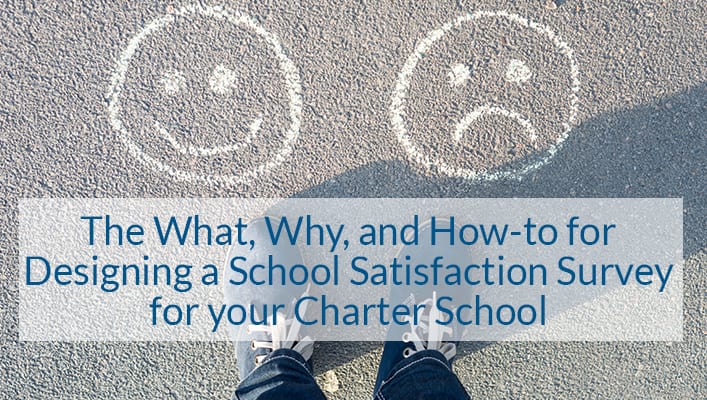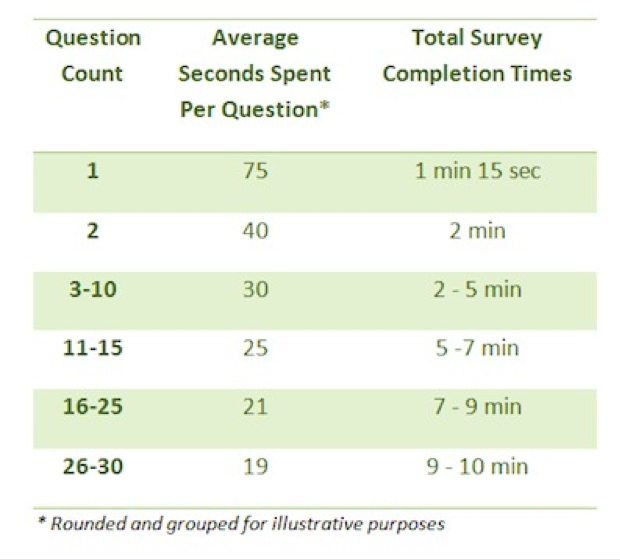 The What, Why, and How-to for Designing a School Satisfaction Survey for your Charter School
The What, Why, and How-to for Designing a School Satisfaction Survey for your Charter School
Your charter school’s success depends on many things, but key among them is how satisfied your key stakeholders are with your school. The easiest way to understand this is to ask them! For example, here are a few vital questions a school satisfaction survey can answer: How satisfied are your parents? How satisfied is your staff?
What is their risk of defection? What parts of the school are they satisfied with and what parts do they find lacking?
Your students (and their families) are your ‘customers’ so keeping them satisfied with the quality of your school’s offerings is vital to maintaining – and ideally increasing – enrollment, and therefore important to your school’s financial wellbeing.
There are two ways to increase enrollment at your school: attracting new families or retaining more of your existing families. Schools spend a lot of time, money and effort in attracting new families, but retention is often somewhat considered an afterthought.
But, it is a lot easier to keep families than it is to attract new ones—and there is a significant cost benefit. Different sources will cite different costs, but the standard rule of thumb that I have found is that it generally costs five times more to attract a new customer than it is to retain one. This is one very good reason that understanding the true satisfaction levels of your ‘customers’ can be imperative to your school’s health and retention rates.
Many school leaders shape their perception of parental satisfaction by the interactions that they have with parents. But this is generally not representative of how your entire parental base feels, and often, it is skewed towards the very engaged, the often so-named “high maintenance” parents – or simply the loudest voices in the room.
But, parents are just one of your key stakeholders. Your staff forms the backbone of your school, so understanding how to keep them satisfied and motivated in their job also needs to be a critical part of any principal’s (or leadership team’s) goals for the year.
A simple school satisfaction survey, administered yearly to both your parents and staff, will give you a wealth of information and allow you to understand how the majority of your parents and staff feel about your school.
Here are the five key questions you should ask yourself when you are planning your school satisfaction surveys:
1. Should you conduct the survey on your own or should you pay to have this done?
The Do-it-Yourself Option:
There are several free online survey vehicles out there. You can use Survey Monkey, Survey Gizmo, or you can even create a survey using Google Forms. If you have the time and knowledge, you can pull together a decent survey.
But a DIY approach can have some noteworthy drawbacks:
- Parents are often leery of being completely honest if they think that in some way their answers can be tied back to them or their child. Even though you tell them it is anonymous, they may not believe you. You run the risk of getting watered down feedback.
- If you are doing this for staff – they will never be honest since they feel that this is not anonymous, and it will impact their job if they voice a negative opinion.
- Writing good questions is an art as well as a science. There is a skill in crafting questions that can get at the underlying issues. You can probably get there eventually, but you might find that this is taking more time than you wanted to spend.
- Analyzing survey results is another time-consuming task. Is this really where your time is best spent?
Professional Survey Service Options
Market research firms regularly conduct customer satisfaction surveys for their clients. The one caution I would make is to try to find a firm that does these for schools. There are often nuances in education that need to be considered when conducting these types of surveys.
Additionally, these organizations will be able to provide context and benchmarks from other schools similar to yours so you know if you are truly doing well or need to make some improvements.
Some options for survey firms:
2. How long should your survey be?
If this is your first time running a school satisfaction survey, there might be a tendency to ask too many questions. Schools often take the “kitchen-sink” approach in their surveys because, although some of those the answers may be interesting, they may not really be actionable or helpful for achieving your specific survey goals.
Survey Monkey recently published some interesting data about survey completion. They looked at surveys ranging from 1-30 questions from 100,000 users. This research uncovered some interesting data.
 This chart shows that the higher the number of questions, the smaller amount of time people are thinking about the answer. Additionally, Survey Monkey found that the abandonment rate increased for longer surveys. Surveys that were longer than 7 – 8 minutes saw their completion rates drop by 5 – 20%.
This chart shows that the higher the number of questions, the smaller amount of time people are thinking about the answer. Additionally, Survey Monkey found that the abandonment rate increased for longer surveys. Surveys that were longer than 7 – 8 minutes saw their completion rates drop by 5 – 20%.
3. What should you ask?
This will vary by school, but the most important question to ask is the Net Promoter Score (NPS). This is a simple question and is widely used across businesses to measure satisfaction. It is a simple question and states, “On a scale of 0 – 10, how likely are you to recommend (your school) to a friend or colleague”.
To gain your NPS, you break your respondents into three groups. Parents who scored you a 9 or 10 are your “promoters”. 7-8 are passives and 0 – 6 are “detractors”. To get your score, take the percentage of promoters, subtract the percentage of detractors and throw out the passives. Voila! You have your NPS score.
Understanding how your NPS score compares against other schools is a bit tricky. (Another potential reason to use an outside consultant), but Temkin Group publishes yearly statistics on industry NPS scores. You really want to approach the level of Amazon at an NPS score of 47 versus that of the cable companies which average around -11!
This NPS is a good standard question that you can use every year to track your progress on improvement.
Here are other topical questions that you may want to ask:
- Opinion on overall academic quality
- Use of technology in the classroom
- How safe is the school
- The effectiveness of differentiated instructional programs
- Enrichment / after school programs
- Communication programs
- The overall trend of the school (getting better, staying the same, getting worse)
- Quality of the cafeteria and food offerings
The last one may seem to be of low importance, but in the surveys that I have run, this is an important criterion for the younger (millennial) parents.
If you are also surveying your staff – you will want to include questions related to their overall job satisfaction:
- Do they feel valued by the administrative team?
- Do they feel that the administrative team supports their efforts in the classroom?
- Do they feel that they have enough professional development opportunities?
I also generally recommend to clients that we include a number of “open-ended questions”. These are questions such as:
- What is the one thing you would like to see improved at our school?
- Are there additional things you would like the administration to know that weren’t covered in this survey?
Since these questions are qualitative in nature, you can’t track them through a simple metric, but they will give you a lot of very interesting insights into what your parents (and staff) are thinking
4. When should you conduct a school satisfaction survey?
Generally, you have three windows to run your surveys:
- October – November
- January – February
- March – April – May
These avoid a lot of the holidays and you always want to give new parents a couple of months to familiarize themselves with your school before you survey them.
You should also consider running your satisfaction survey every year. It can be easy to fall into the habit of just doing a satisfaction survey as part of your reaccreditation process. However, running a survey once every 5 – 7 years only gives you a snapshot, not a trend.
Considering that every year, 15% of your families are new to your school, you’ll definitely want to run this every year to capture each incoming class and be able to map their satisfaction trends over time.
5. What should you do with the results?
Use the data for planning for improvements for next year, and to track how well you are hitting your satisfaction goals. Take them to your board of directors and share with your leadership team so that they have key insights into your school’s success—and an understanding of any areas that may need work.
Be very careful if you choose to not release the results of the school survey to your parent base. I always advocate to my clients that transparency on results is best, but only if you are also telling parents what your plan is to address their critical feedback.
If you choose not to release the results, don’t be surprised if parents don’t answer your next survey, or assume that the reason why you didn’t release the results is because they were bad.
I hope that this information helps you to understand the value of creating and implementing a school satisfaction survey and why it benefits your school to do one each and every year.
Nick LeRoy, MBA, is the president of Bright Minds Marketing and former Executive Director of the Indiana Charter School Board. Bright Minds Marketing provides enrollment and recruitment consulting to private, Catholic and charter schools. For information about how Bright Minds Marketing can help your school improve its’ student enrollment, send an email tonick@brightmindsmarketing.com or call them at 317-361-5255.
Since the company’s inception in 2007, Charter School Capital has been committed to the success of charter schools. We provide growth capital and facilities financing to charter schools nationwide. Our depth of experience working with charter school leaders and our knowledge of how to address charter school financial and operational needs have allowed us to provide over $1.6 billion in support of 600 charter schools that educate 800,000 students across the country. For more information on how we can support your charter school, contact us. We’d love to work with you!